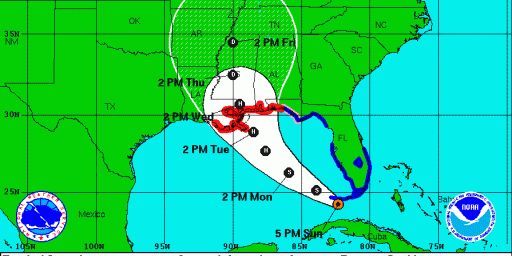Lawmakers Propose Defense Cuts to Offset Katrina Relief
Several House Republicans have proposed cuts in military benefits and austerity measures for other federal workers to offset the cost of Hurricane Katrina.
GOP members propose military cuts to offset Katrina costs (Army Times)
A group of House Republicans have proposed a plan to offset the costs of relief and rebuilding after Hurricane Katrina that includes trimming military quality-of-life programs, including health care. Possible sources of funding cuts to free up money for Katrina relief include reduced health benefits, consolidation of the three military exchange systems and the closure of the military̢۪s stateside school system.
The House Republican Study Committee, headed by Rep. Mike Pence, R-Ind., is not singling out the military as it tries to raise the estimated $200 billion that the federal government will need for various Katrina-related spending. Their proposal includes freezing congressional pay, charging federal workers for parking and cutting back on legislative earmarking — items added to agency budgets by lawmakers — as ways of raising money. They call their effort “Operation Offset,†and hope to get spending cuts considered before Congress approves any more money devoted to Katrina relief and recovery operations.
Their offset list includes three provisions aimed at military quality-of-life programs:
• Service members would be offered cash if they are willing to accept reduced health care benefits for their families. “The less comprehensive plan would encourage individuals to be more cost-conscious when purchasing health care products by including deductibles, co-payments and a maximum annual out-of-pocket expenditure limit,†according to a written explanation provided by the study group. Reduced health care benefits could save $2.4 billion over 10 years.
• The three separate military exchange systems could be consolidated, saving up to $1.9 billion over 10 years, the study group says. The Army and Air Force share an exchange system, AAFES, while the Navy and Marine Corps have their own systems. “Consolidating … would eliminate inefficiencies from duplicative purchasing, different personnel departments, warehouse and inventory systems and management headquarters while retaining the current ability for service embers and their families to receive a wide selection of goods at a low price,†the statement says. The Pentagon has studied the idea of exchange consolidation for years but has been unable to overcome bureaucratic obstacles and opposition from some service officials and industry groups. Several studies of the issue also have raised questions about how much money would be saved.
• The stateside system of elementary and secondary schools for military family members could be closed, saving $788 million over 10 years, the study says. “This provision would phase out these domestic schools over time and shift these military children into the local public school systems,†the study group says. The Pentagon also has been studying this idea, but has faced strong opposition from parents of children attending the schools because public schools are seen as offering lower-quality education.
Cutting benefits for our military personnel in the midst of a long war and the resultant recruiting and retention difficulties is, on its face, unwise. Nonetheless, some of these proposals have merit aside from Katrina.
Consolidating the exchanges has long been obvious, although the savings are less than a drop in the bucket compared to the $200 billion or more the federal taxpayer will spend on Katrina relief.
For the most part, closing on-base schools makes sense, too. I grew up in a military family and only attended DoD schools while overseas and the year we were stationed at Ft. Leonard Wood, Missouri about 1000 miles from civilization. As the military adopts personnel policies that keep soldiers in one duty station several years at a time, most of the rationale for separate schools is gone. Special provisions might be necessary, though, for remote outposts like Ft. Leonard Wood.
The continued erosion of the military health care system is worrisome. Twenty years ago, it was simply presumed that soldiers, their dependants, and retirees would have free access to military hospitals and insurance-like access to civilian hospitals. That’s no longer the case. With our current high operations tempo keeping soldiers away from their family for eighteen months or more, the last thing they need to worry about is ensuring that their families’ health care needs are being met.
Again, though, the savings realized from the combination of these measures is a mere pittance. Even if the projections above prove accurate, we would save a mere $5.1 billion over the next decade. We spent that the first day of Katrina.






I think you hit the nail on the head with this one. The savings from these things is a mere drop in the bucket and hardly sends the right message to our military personnel.
But at least Don Young will get to keep his bridge in Alaska.
Along with the million dollar bus stop.
This is not about “sending messages”. This is about our government’s continued willingness to throw billions at unproductive members of society, whose main contribution is sitting on their posterior complaining about what they get, while putting the screws to those who sacrifice everything for our way of life.
Lost in the focus on the military is the little gem that they plan to target the fed workforce as well. Federal employees don’t make a ton of money and yet they’re thinking of hitting us with increased parking payments and who knows what else?
That the tax cuts are in jeopardy as well means that many, many people will be hit in their wallets twice.
Well, federal workers in D.C. already have to pay to park. It is rather odd, though.
This is not about “sending messagesâ€Â. This is about our government’s continued willingness to throw billions at unproductive members of society, whose main contribution is sitting on their posterior complaining about what they get, while putting the screws to those who sacrifice everything for our way of life.
IF that isn’t sending a message, I don’t know what is. 🙂
LJD, for once, I agree with everything you said. I know its just a ‘study’ right now, but any congresscritter who puts their name on this shameful, cowardly pile of crap needs to be thrown out on their ass, regardless of affiliation or seniority.
If this proposal goes into effect and federal workers are affected,
Listen to the feather merchants (bureaucrats) howl. I bet I could hear them right here in the Midwest.
Over a lifetime of observation I have always noticed the disconnect between what Republicans say and do about our military. Likewise I’ve learned not to trust what Republicans say Democrats will do with military and just to wait and see what they actually do.
My overall conclusion is that Republicans treat the military as tools, Democrats treat them as people.
Neither approach is 100% good or bad. It just explains the Democratic tendency to want to coddle them with benefits and the Republicans tendency to want to use them. It also explains why elected Republican leaders see no problem in cutting their benefits, benefits being such a liberal Democratic thing.
‘Federal employees don’t make a ton of money and yet they’re thinking of hitting us with increased parking payments and who knows what else?’
Boo – f’ing – hoo. How come whenever there’s an emergency shut down and ‘non essential employees’ aren’t required to ‘work’ about 90% of the employees don’t come in? Who do you think pays for parking in the DPS (dreaded private sector).
If you don’t think I know what I’m talking about let me mention that my wife’s uncle was a 16 term US Rep and let me think of which relatives he arranged ‘jobs’ for. 2 son-in-laws,1 went from being a teacher to being director of the regional SBA, the other one, well he was a teacher too and he went to be an undersecretary in HEW, a niece who never held a DPS job but went to a series of jobs including SSA which she repeatedly got fired from, daughter who went from doing nothing to being some sort of grant administrator another daughter who while not working for the gov’t worked in some quasi private ‘job’ doing nothing invovling property mgmt of subsidized housing. The employment opportunities are just endless when you have access to other people’s money.
“Democrats treat them as people.”
Yeah, civilians, because they don’t want a military.
“Democratic tendency to want to coddle them with benefits”
…like unemployment and welfare.
As for “Federal Employees”, if your job is not absolutely vital to the security of this nation, well, the paper-pushers must go!
You could save a lot more by instituting co-pays for Medicare recipients. Here in California, 20% of the state is on Medi-Cal (our version here), and most of those are not in managed care. If they had even a $5 copay, with exemptions for chronically sick people, it would raise a lot of money. I don’t think charging $5 to see a doctor is too steep. Cutting military health care is absurd.